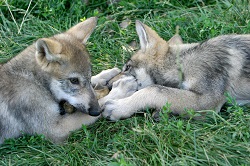Adult wolves use playtime to reinforce their dominance over puppies
Adult wolves maintain their dominance over wolf puppies even during play, the EU-funded project CANCOOP has discovered. Play is viewed as competitive interaction between playmates used to test and improve their abilities in a safe setting. The findings, published in the journal ‘PLOS ONE’(opens in new window) in May 2016, refute the theory that adult wolves may soften their behaviour when interacting with puppies in order to encourage them to play. Instead, they maintain their dominant status. Wolves are highly social animals who rely on cooperation between individuals in a pack for breeding, hunting and defending their territory and food. CANCOOP, which will run until January 2018, is studying emotional and socio-cognitive processes in wolves including empathy, aversion to inequity and delayed gratification. The project’s latest findings are key to understanding the social interactions of wolves – information which can then help manage wolf populations in both the wild and in zoos. During the experiment phase of the project, two packs of adult wolves - Canis lupus occidentalis - and wolf puppies aged 3 to 5 months were observed for play and non-play interactions. This took place at the Wolf Science Centre in Ernstbrunn in Austria in both 2009 and 2012. Each wolf pack contained six wolf puppies. They were brought to the centre before they reached ten days old and were hand-raised by professional trainers. The wolf packs were then filmed during play and non-play interactions in the animals’ home enclosure - large, fenced outdoor areas with both shelter and tree lined areas. Scientists working on the project started off with the hypothesis that, in order to facilitate play, individual wolves might act to maintain equality with their play partner. This is known as the ‘50:50 rule’ - or where each player is ‘winning’ or ‘losing’ 50 % of the time. To keep to this play ‘rule’, a dominant animal may ‘self-handicap’ to put itself at a disadvantage, allowing a subordinate playmate to ‘win.’ Self-handicapping behaviours are when an individual animal gives up a competitive advantage, for example by lying on their back or by being physically underneath their partner. However, study results showed that adult wolf and wolf puppy play did not seem to follow this rule. In puppy to adult pairs, it was the puppy who engaged in self-handicapping and less offensive behaviours, not the adults. Adult wolves carried out significantly less self-handicapping behaviours than their puppy play partners. They also performed significantly more offensive behaviours during play, including biting and chasing their partner, according to the CANCOOP team. The rates of self-handicapping and offensive behaviours in puppy- pairs were tied to the dominance relationship between them outside of play, the project found adult. Meanwhile, puppy to puppy pairs consistently showed more equal play than puppy to adult pairs, although the degree of equality varied. Scientists now believe that this behaviour may reinforce the dominant adult and subordinate puppy hierarchy which is established outside of play behaviour within a pack of wolves. Finally, the CANCOOP study also found that wolf play traits are similar to those found in domesticated dog play dynamics. For more information please see: CORDIS project website(opens in new window)
Countries
Austria



